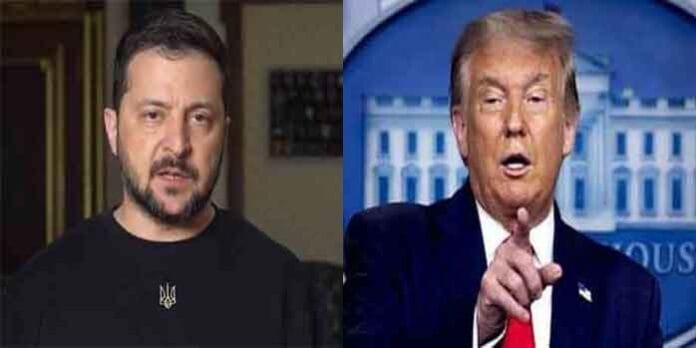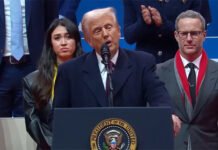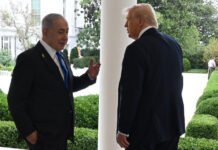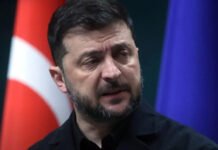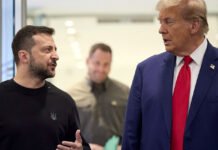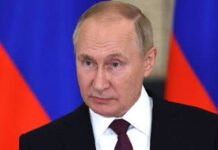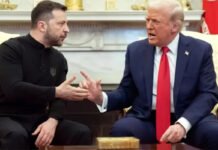The U.S. President Donald Trump has once again made headlines by openly criticizing Ukrainian President Volodymyr Zelensky, French President Emmanuel Macron, and British Prime Minister Keir Starmer. In a recent interview, Trump expressed frustration over these leaders’ lack of decisive action in ending the Russia-Ukraine war. His remarks signal a sharp shift in his stance on Ukraine and raise questions about the future of U.S. involvement in the ongoing conflict.
Trump’s Changing Stance on Zelensky and Ukraine
During a recent interview with Fox News, Trump intensified his criticism of Volodymyr Zelensky, questioning Ukraine’s role in the ongoing peace negotiations. According to Trump, Zelensky’s involvement in the discussions is unnecessary and could potentially hinder efforts to reach a resolution.
Trump stated, “Zelensky doesn’t have to be part of the peace talks. He makes things more complicated, and we can’t allow this war to drag on any longer.”
This statement marks a significant shift from Trump’s earlier comments about Zelensky. In previous remarks, he had called him a “dictator without elections,” referring to Ukraine’s decision to postpone elections due to martial law. However, his latest comments suggest that he now believes Ukraine should take a less active role in negotiating a peace settlement.
Trump’s Criticism of Emmanuel Macron and Keir Starmer
Beyond Zelensky, Trump also targeted Emmanuel Macron and Keir Starmer, criticizing their failure to take meaningful steps to end the war. He described their approach as passive and ineffective, saying,
“Macron has done nothing. He’s my friend, but no one in Europe has taken any real action. It’s time they step up.”
Trump’s remarks suggest that he sees European leadership as weak when it comes to handling the Russia-Ukraine conflict. He expressed disappointment that the United Kingdom and France—two of Europe’s most powerful nations—have not played a more active role in resolving the crisis.
According to Trump, these leaders will soon visit Washington, D.C., where he intends to confront them directly about their inaction.
The Growing Divide Between Trump and Ukraine
Trump’s recent remarks underscore an increasing divide between him and Ukraine’s leadership. This tension escalated when Ukrainian officials were excluded from a key ceasefire negotiation meeting held in Saudi Arabia. The decision to leave Ukraine out of the talks angered Zelensky, who demanded that Ukraine be included in any future negotiations.
However, Trump appears to believe that the U.S. should prioritize its own interests over Ukraine’s demands. He has repeatedly questioned the billions of dollars in military aid sent to Ukraine under the Biden administration, arguing that the U.S. should receive something in return.
Trump’s Proposal: Ukraine Should Offer Natural Resources to the U.S.
In the same interview, Trump suggested that Ukraine should compensate the U.S. for its financial and military support. He proposed that American companies should receive priority access to Ukraine’s vast natural resources in exchange for the aid already provided.
“We are giving them billions of dollars. What are we getting in return? Ukraine has incredible natural resources, and American companies should have first rights to those.”
This proposal, while controversial, aligns with Trump’s broader “America First” policy, which prioritizes economic benefits for the U.S. over foreign aid commitments.
Zelensky’s Response to Trump’s Statements
So far, Volodymyr Zelensky has not directly responded to Trump’s latest remarks. However, in previous interviews, he has dismissed Trump’s claims that he could end the war in 24 hours as unrealistic and uninformed.
Zelensky has repeatedly insisted that Ukraine will not accept any peace deal that allows Russia to retain control of occupied territories. His firm stance has led to frustration among some Western leaders, who believe that a negotiated settlement may be the only way to end the conflict.
The Role of Russia and Putin in Trump’s Perspective
While Trump has been vocal in his criticism of Western leaders, he has taken a notably softer approach toward Russian President Vladimir Putin. In the same interview, Trump stated that he had a “very good relationship” with Putin and that he believes he could negotiate a peace deal quickly if he were to return to the White House.
“I spoke with Putin. We had a great relationship. If I were president, this war would never have happened, and if I were in office now, I would end it in a day.”
Trump’s repeated claims that he could end the war swiftly have drawn skepticism from political analysts. Many experts argue that Russia’s strategic goals and Ukraine’s territorial integrity make a quick resolution highly unlikely.

